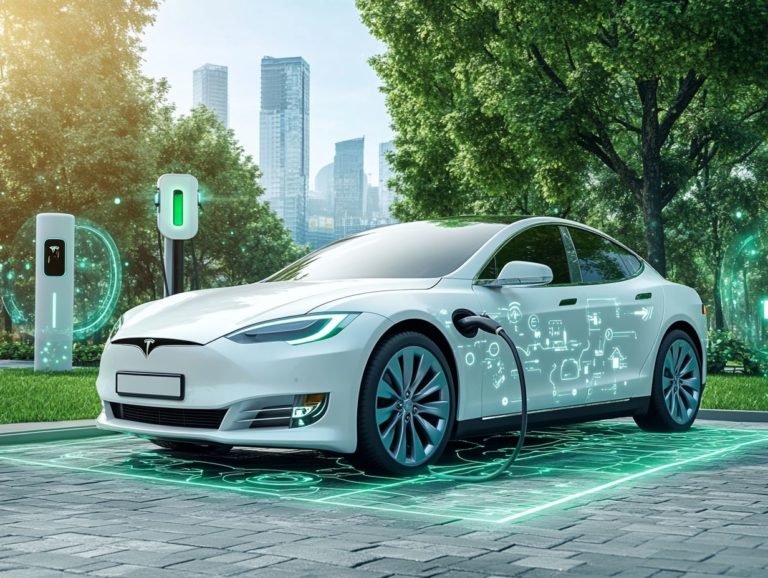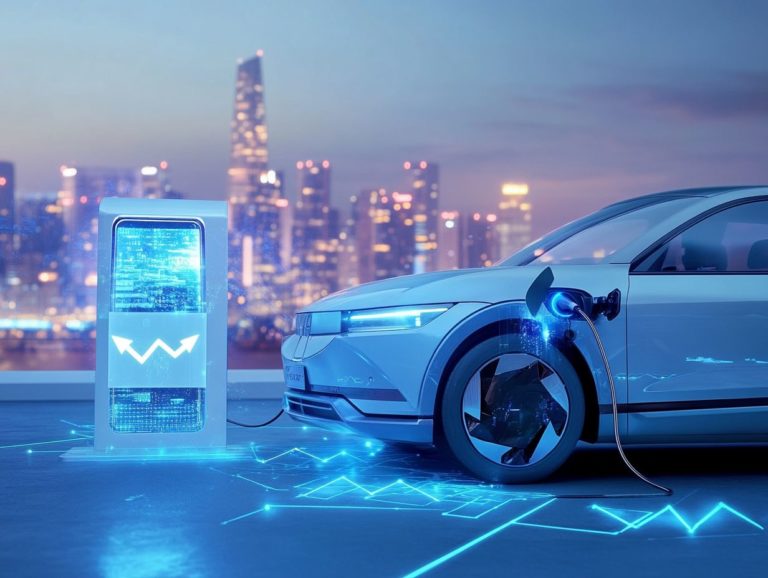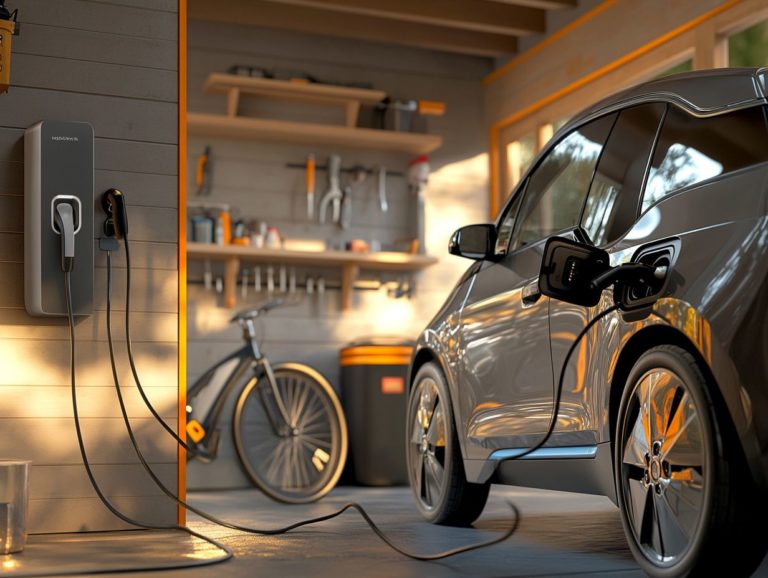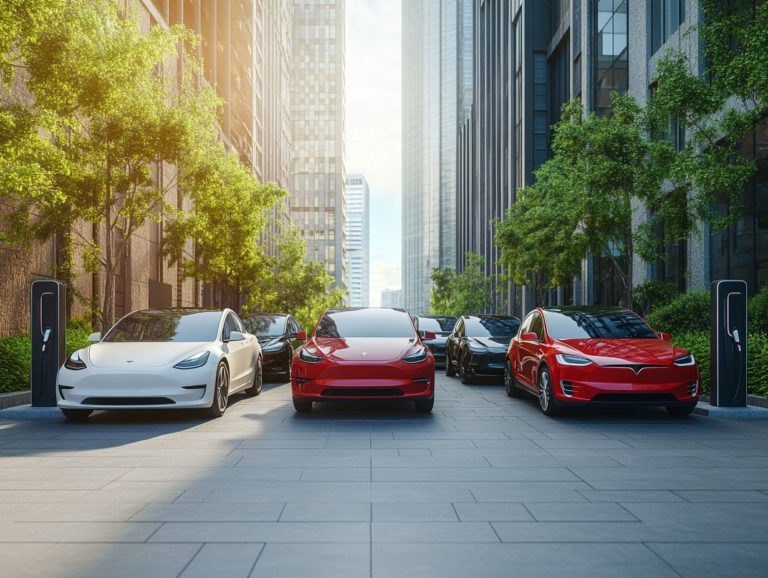What Are the Common Myths About Electric Vehicles?
Electric vehicles (EVs) are swiftly gaining momentum in the automotive landscape, yet a cloud of misconceptions still lingers around them.
Many people believe that EVs aren’t truly environmentally friendly or that they come with an exorbitant price tag. There are also concerns about their range and practicality for everyday use.
This article aims to dispel these prevalent myths, shedding light on the genuine advantages of EV technology ranging from cost-effectiveness to impressive performance and illustrating how these vehicles are transforming our roads for the better.
Contents
- Key Takeaways:
- Myth: EVs Are Not Environmentally Friendly
- Myth: EVs Have Limited Range
- Myth: EVs are Expensive
- Myth: EVs are Not Practical for Everyday Use
- Myth: EVs are Hard to Charge
- Myth: EVs are Not as Powerful as Gasoline Vehicles
- Frequently Asked Questions
- What Are the Common Myths About Electric Vehicles?
- Do electric vehicles have limited range?
- Are electric vehicles expensive to maintain?
- Are electric vehicles bad for the environment?
- Is it difficult to find charging stations for electric vehicles?
- Do electric vehicles have poor performance?
- Can electric vehicles catch on fire easily?
Key Takeaways:
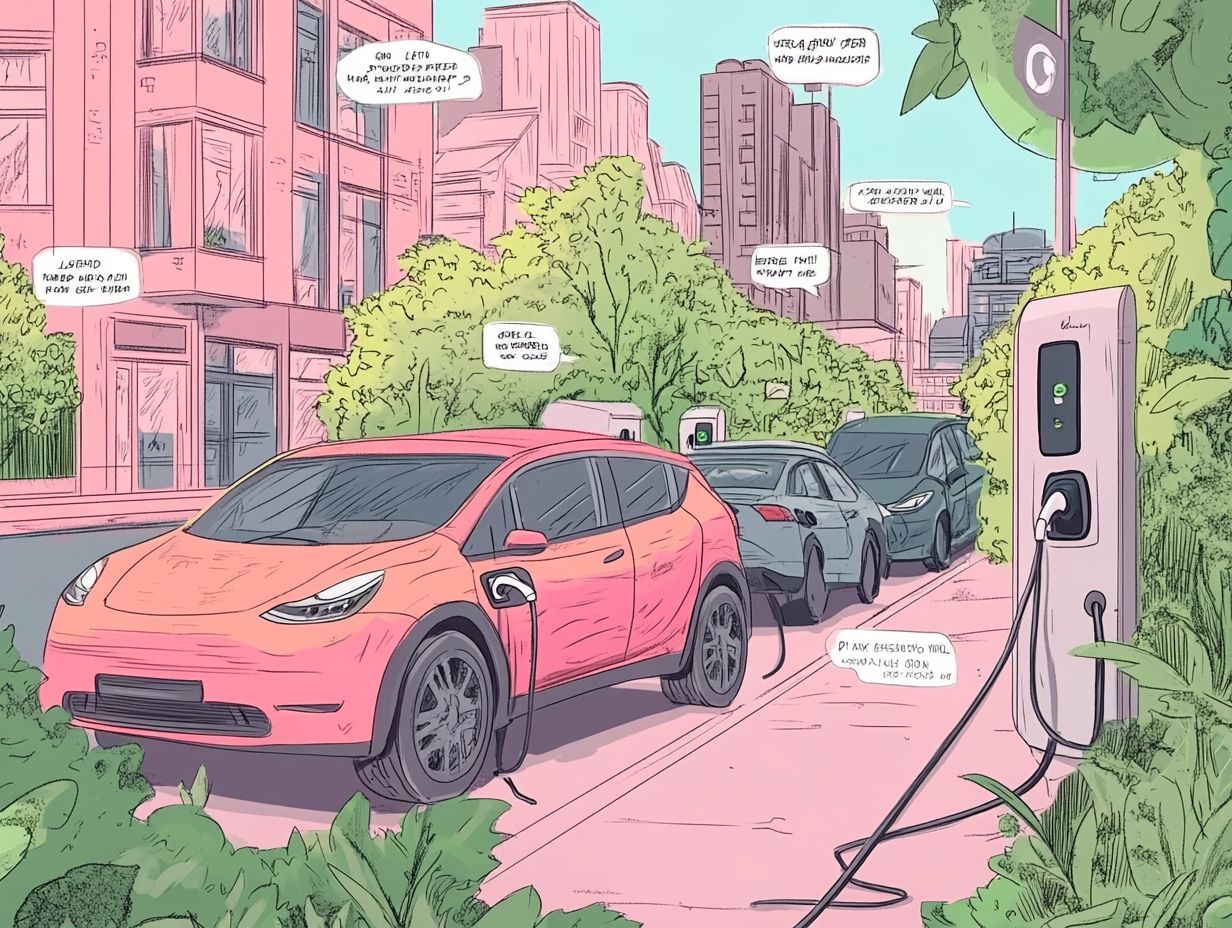
- EVs help save the planet with zero emissions!
- Range anxiety is a thing of the past with extended ranges and widespread charging infrastructure.
- Despite the initial cost, the long-term savings from lower fuel and maintenance costs make EVs a smart choice for consumers.
Overview of EV Technology
The landscape of EV technology has transformed dramatically in recent years, ushering in a new era of electric vehicles that promise to redefine your daily travel while significantly reducing greenhouse gases and carbon footprints.
With an impressive selection available from the rugged Ford F-150 Lightning to the compact Nissan Leaf, the luxurious GMC Hummer, and the tech-forward Tesla Model Y you can find a vehicle that perfectly aligns with your unique needs and lifestyle.
Innovations in battery technology, like solid-state batteries (which charge faster and last longer than traditional batteries) and increased energy storage (the amount of energy stored in a battery per unit weight), are boosting driving ranges and reducing charging times, making ownership more convenient than ever.
The growth of charging stations and the introduction of smart chargers play a crucial role in ensuring that electric vehicle use is practical and accessible, ultimately supporting efforts to achieve emissions reduction goals.
In the UK, government initiatives and regulations are robustly supporting the transition to electric vehicles, encouraging investments in infrastructure, promoting renewable energy, and paving the way for a greener future.
Myth: EVs Are Not Environmentally Friendly
One prevalent myth surrounding electric vehicles is the notion that they aren’t environmentally friendly, a claim that fundamentally contradicts their design and purpose. Unlike traditional gasoline cars, EVs offer substantial advantages in reducing emissions and harnessing renewable energy sources for power.
This shift means we can rely less on fossil fuels, making a real difference for our planet while also decreasing carbon pollution.
Debunking the Misconception
To debunk the misconception that electric vehicles (EVs) aren’t environmentally friendly, we need to closely examine their overall impact on carbon footprints and emissions reduction efforts.
When comparing traditional internal combustion engine vehicles to electric vehicles, it’s clear that EVs typically emit far fewer greenhouse gases over their lifetime. Studies indicate that EVs can cut CO2 emissions by up to 60%, even when factoring in emissions from electricity generation.
The ongoing advancements in battery technology are improving energy storage, which translates to longer driving ranges and reduced reliance on fossil fuels.
The integration of smart charging technology allows you to optimize charging times, enabling you to harness renewable energy sources such as wind and solar power. These innovations not only enhance efficiency but also strengthen the long-term viability of electric transportation, further minimizing environmental impact.
Myth: EVs Have Limited Range
The misconception that electric vehicles come with limited range frequently creates range anxiety for potential users, discouraging them from fully embracing this groundbreaking technology.
However, with advancements in battery technology and a rapidly expanding EV market, you now have access to a variety of models, such as the Ford F-150 Lightning and Tesla Model Y, that boast competitive ranges rivaling those of traditional gasoline vehicles.
Embracing these innovations could shift your perspective entirely don’t miss out on the future of driving understand the truth about EVs today!
Addressing Range Anxiety
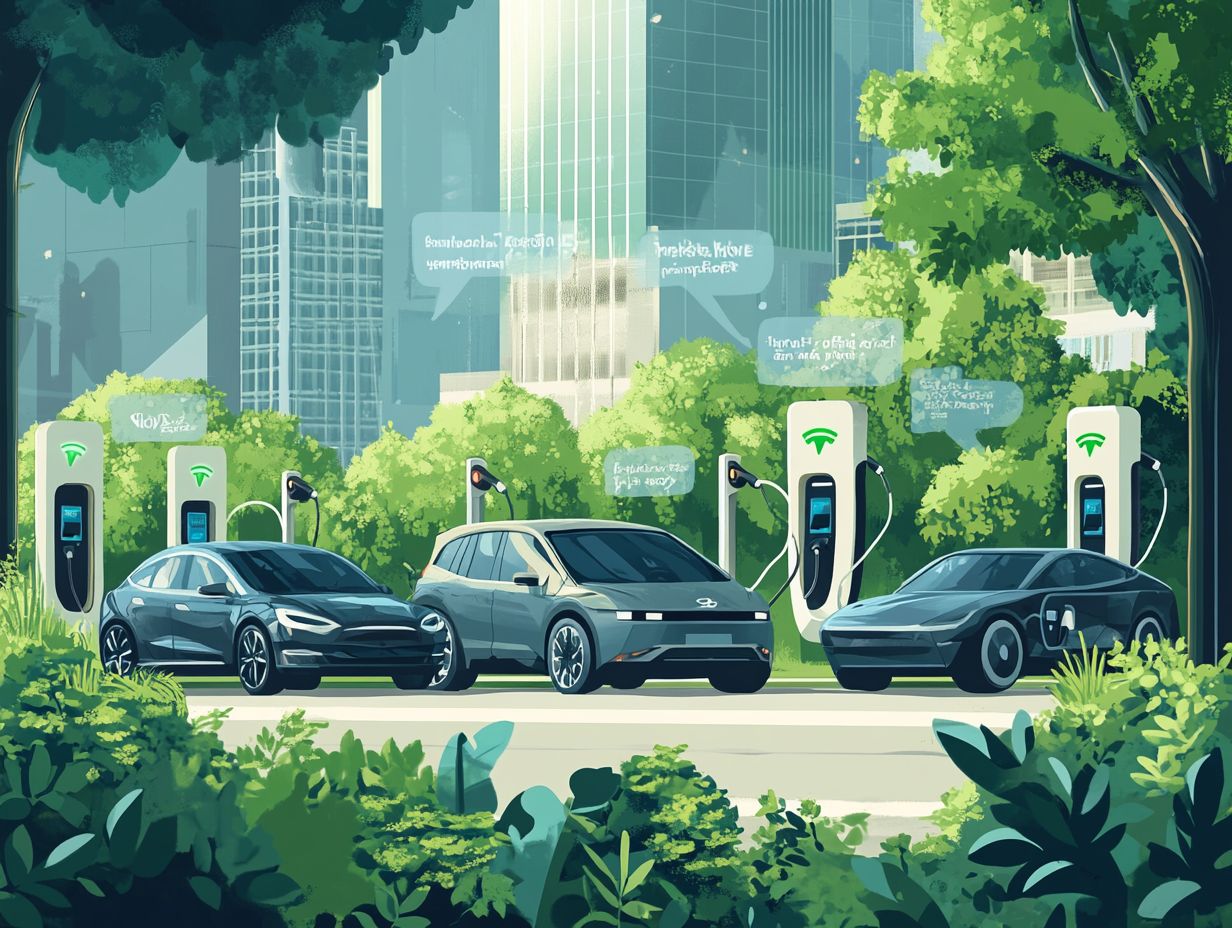
Addressing range anxiety is essential for the widespread acceptance of EV technology. You can achieve this through the development of a strong charging infrastructure that meets your daily travel needs.
This infrastructure should include not only an increase in public charging stations but also the advancement of smart chargers designed to optimize charging speed and efficiency. As you become more familiar with electric vehicles, your concerns about running out of battery during commutes or road trips will significantly diminish.
Statistics indicate that nearly 60% of potential EV buyers are deterred by range anxiety. This highlights the critical need for both home and public charging solutions.
Initiatives like fast-charging networks can dramatically reduce waiting times, instilling greater confidence in you and effectively dispelling fears of insufficient range.
Myth: EVs are Expensive
The notion that electric vehicles are prohibitively expensive is a prevalent myth that can obscure the true cost of ownership.
When you look beyond the initial price tag, it s essential to consider various financial factors such as battery warranties, maintenance costs, and the significant savings on fuel that can reshape your understanding of affordability.
Want to Know the True Cost of Ownership?
Understanding the true cost of owning an electric vehicle involves evaluating various factors, from the purchase price to battery warranties and expected charging times. All these can significantly impact your overall expenses.
As a potential buyer, consider ongoing costs such as insurance rates, which can vary between electric and conventional vehicles. Maintenance expenses typically lean in favor of EVs, thanks to fewer moving parts. Also, energy costs linked to charging deserve your careful attention.
Don t miss out on financial incentives that can save you money! Many regions offer enticing options like tax credits, rebates, or reduced registration fees specifically for EV purchases. By considering these factors collectively, you ll gain a clearer financial perspective, enabling you to assess how your initial investment and potential long-term savings compare to traditional vehicles.
Myth: EVs are Not Practical for Everyday Use
The idea that electric vehicles (EVs) lack practicality for everyday use fails to recognize the remarkable versatility of modern electric vehicles. These cars have been crafted to meet the demands of daily travel as efficiently as their traditional counterparts.
Exploring the Versatility of EVs
You ll be amazed at how these vehicles can cater to your diverse needs while minimizing both maintenance hassles and environmental impact.
For instance, compact models are perfect for your city commutes, offering agility and making parking in crowded urban spaces a breeze. On the other hand, models with extended range capabilities turn long-distance travel into a seamless experience, ideal for those venturing into more remote areas.
The integration of charging stations has made a remarkable leap, with urban centers featuring extensive networks that enhance your convenience. Rural regions are catching up, driven by the growing demand of an expanding EV market.
Thanks to advancements in battery technology and charging speed which refers to how quickly a battery can recharge EVs have become even more practical. They can now effortlessly accommodate various lifestyles and preferences.
Myth: EVs are Hard to Charge
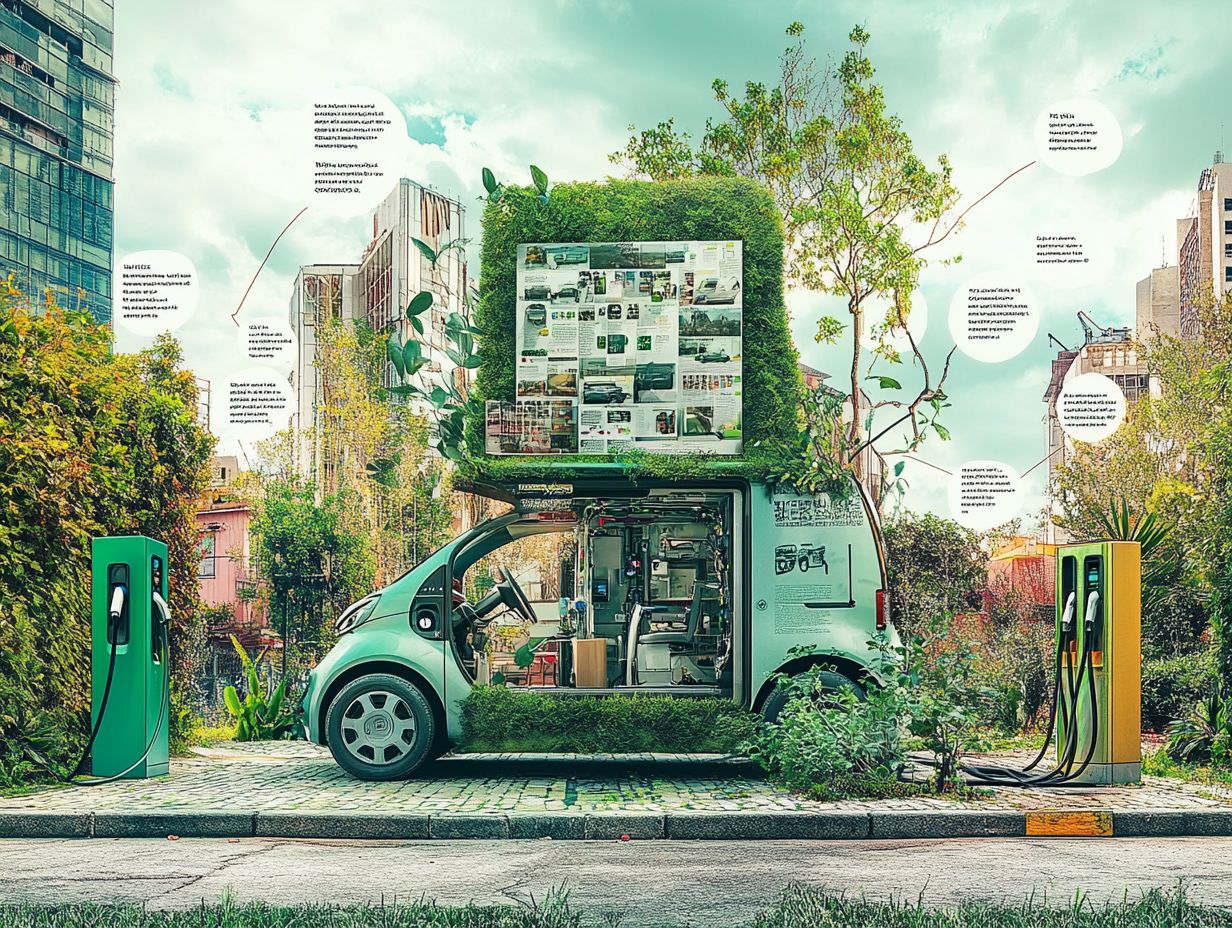
The idea that electric vehicles are difficult to charge often arises from misconceptions surrounding the charging process. In reality, this process has advanced remarkably with the introduction of modern charging stations and convenient home charging solutions.
Are you ready to explore EV options and check your local charging stations? Dive in and discover the benefits of switching to an electric vehicle!
Explaining the Charging Process
The charging process for electric vehicles unfolds through several distinct stages. It starts from locating charging stations to leveraging smart chargers that optimize your charging time.
Initially, you can use mobile applications or your in-car navigation system to find nearby charging stations, often filtering your options based on availability and charger type.
Once you ve identified a suitable station, the next step is to familiarize yourself with the different charging options available:
- Level 1 chargers: Typically found in residential settings, these can take several hours to fully charge your EV.
- Level 2 chargers: Commonly located in public areas, they offer a quicker charging experience, usually completing a charge in just a few hours.
- DC fast chargers: These significantly reduce charging time, enabling you to gain a substantial range in mere minutes.
By integrating smart charging technology, you can enhance your charging experience even further. This technology includes features like scheduling and managing when and how you charge your vehicle to save money, ensuring that you charge your vehicle when electricity rates are lower and maximizing efficiency.
Myth: EVs are Not as Powerful as Gasoline Vehicles
The belief that electric vehicles lack the power of gasoline vehicles overlooks the remarkable advancements in EV technology. These innovations have resulted in impressive performance metrics and capabilities that redefine what electric vehicles can achieve.
Comparing Performance and Power
When you compare the performance and power of electric vehicles (EVs) with traditional gasoline cars, an exciting picture emerges. Electric motors often excel in several key areas, leaving their combustion counterparts behind.
This difference is particularly striking when you look at acceleration times. Many electric vehicles can achieve remarkable speeds in just a few seconds, impressing even the most experienced performance drivers.
For example, models like the Tesla Model S and the Porsche Taycan boast impressive torque figures that provide instantaneous power delivery, drastically enhancing driving dynamics. This surge isn t just about sheer speed; it offers you a seamless and exhilarating driving experience that frequently outshines comparable gasoline vehicles.
Advancements in battery technology like improved energy density and faster charging capabilities show that EVs are serious contenders in the performance arena. This proves that going green can be thrilling!
Learn more about electric vehicles by watching this video:
Frequently Asked Questions
Curious about electric vehicles? Here are some common misconceptions:
What Are the Common Myths About Electric Vehicles?
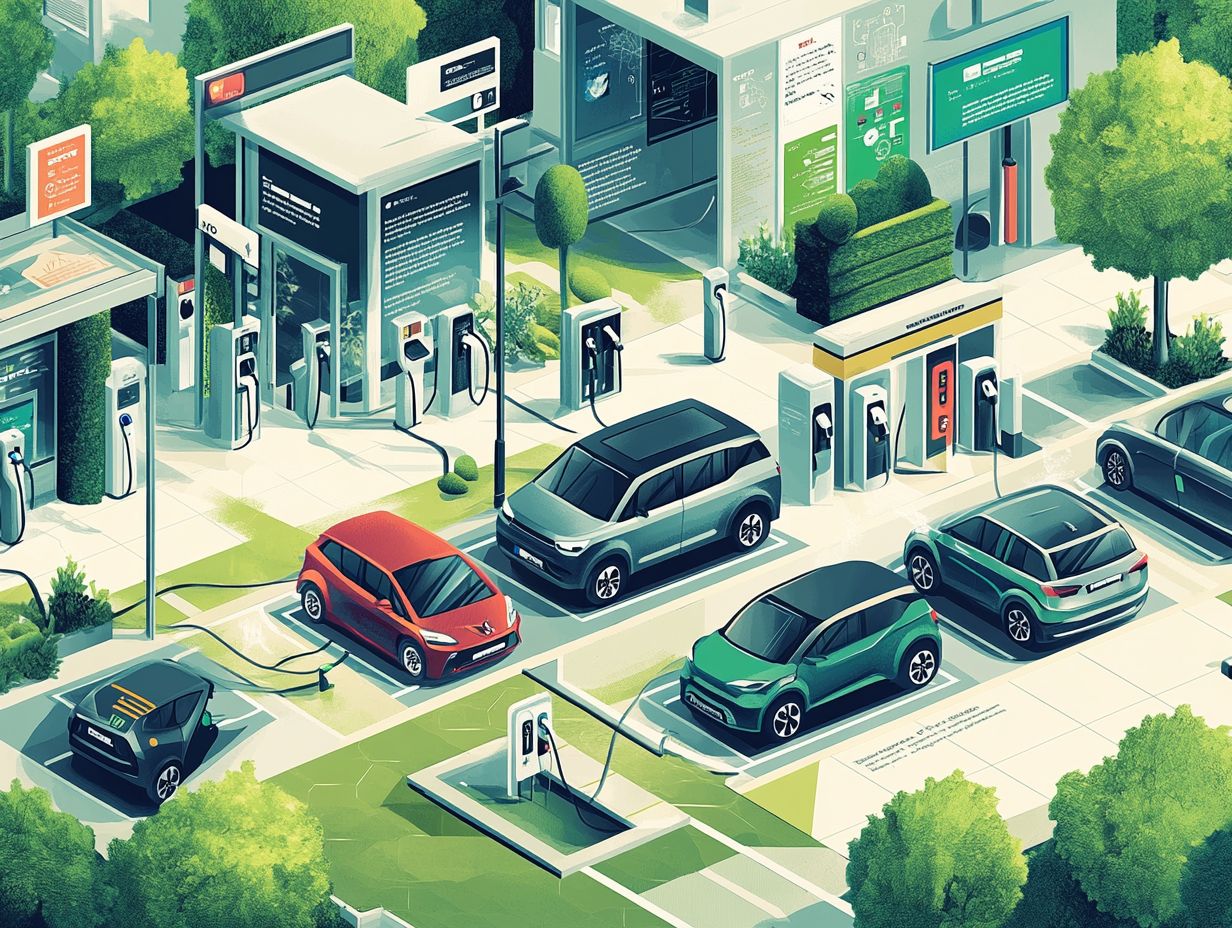
-
Do electric vehicles have limited range?
Many people believe that electric vehicles can only travel short distances. In reality, most modern electric cars have a range of 200-300 miles on a single charge, making them suitable for long-distance travel.
-
Are electric vehicles expensive to maintain?
Contrary to popular belief, electric vehicles are actually less expensive to maintain compared to gasoline-powered cars. They have fewer moving parts and do not require oil changes, spark plug replacements, or other regular maintenance tasks.
-
Are electric vehicles bad for the environment?
Some people think that electric vehicles are not eco-friendly because they use electricity, which is often generated from fossil fuels. However, studies show that electric cars still emit significantly less greenhouse gases compared to traditional cars.
-
Is it difficult to find charging stations for electric vehicles?
Many assume that finding a charging station for an electric car is a hassle. The reality is there are now over 50,000 charging stations in the US alone, and the number continues to grow. Additionally, most electric vehicles can also be charged at home.
-
Do electric vehicles have poor performance?
Another common myth is that electric cars have poor performance. This is simply not true. In fact, electric vehicles feature instant torque, allowing them to accelerate quickly and smoothly. Some electric cars even have faster acceleration times than traditional cars.
Explore electric vehicles further or consider one for your next car purchase!
Can electric vehicles catch on fire easily?
Curious about the safety of electric vehicles? You might be surprised!
Many people believe electric cars catch fire more easily because they use lithium-ion batteries. However, the truth is that electric vehicles are less likely to ignite than gasoline cars.
Strict safety regulations govern the production of lithium-ion batteries. These regulations help ensure the safety of electric vehicles.

